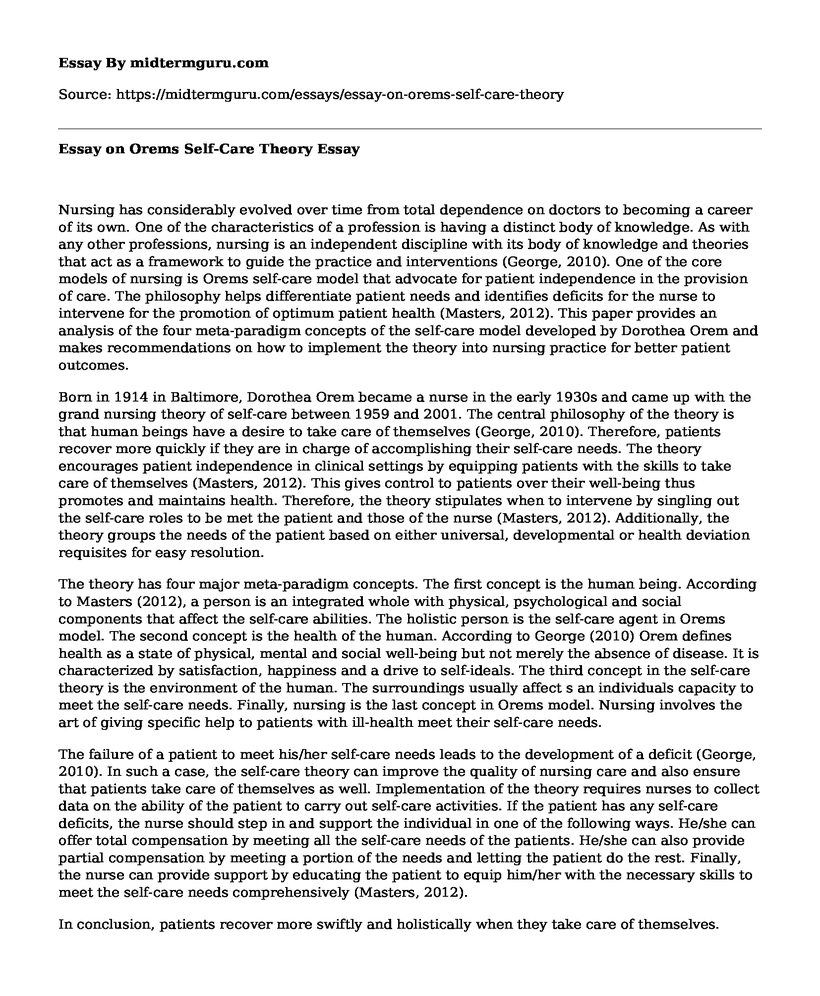Nursing has considerably evolved over time from total dependence on doctors to becoming a career of its own. One of the characteristics of a profession is having a distinct body of knowledge. As with any other professions, nursing is an independent discipline with its body of knowledge and theories that act as a framework to guide the practice and interventions (George, 2010). One of the core models of nursing is Orems self-care model that advocate for patient independence in the provision of care. The philosophy helps differentiate patient needs and identifies deficits for the nurse to intervene for the promotion of optimum patient health (Masters, 2012). This paper provides an analysis of the four meta-paradigm concepts of the self-care model developed by Dorothea Orem and makes recommendations on how to implement the theory into nursing practice for better patient outcomes.
Born in 1914 in Baltimore, Dorothea Orem became a nurse in the early 1930s and came up with the grand nursing theory of self-care between 1959 and 2001. The central philosophy of the theory is that human beings have a desire to take care of themselves (George, 2010). Therefore, patients recover more quickly if they are in charge of accomplishing their self-care needs. The theory encourages patient independence in clinical settings by equipping patients with the skills to take care of themselves (Masters, 2012). This gives control to patients over their well-being thus promotes and maintains health. Therefore, the theory stipulates when to intervene by singling out the self-care roles to be met the patient and those of the nurse (Masters, 2012). Additionally, the theory groups the needs of the patient based on either universal, developmental or health deviation requisites for easy resolution.
The theory has four major meta-paradigm concepts. The first concept is the human being. According to Masters (2012), a person is an integrated whole with physical, psychological and social components that affect the self-care abilities. The holistic person is the self-care agent in Orems model. The second concept is the health of the human. According to George (2010) Orem defines health as a state of physical, mental and social well-being but not merely the absence of disease. It is characterized by satisfaction, happiness and a drive to self-ideals. The third concept in the self-care theory is the environment of the human. The surroundings usually affect s an individuals capacity to meet the self-care needs. Finally, nursing is the last concept in Orems model. Nursing involves the art of giving specific help to patients with ill-health meet their self-care needs.
The failure of a patient to meet his/her self-care needs leads to the development of a deficit (George, 2010). In such a case, the self-care theory can improve the quality of nursing care and also ensure that patients take care of themselves as well. Implementation of the theory requires nurses to collect data on the ability of the patient to carry out self-care activities. If the patient has any self-care deficits, the nurse should step in and support the individual in one of the following ways. He/she can offer total compensation by meeting all the self-care needs of the patients. He/she can also provide partial compensation by meeting a portion of the needs and letting the patient do the rest. Finally, the nurse can provide support by educating the patient to equip him/her with the necessary skills to meet the self-care needs comprehensively (Masters, 2012).
In conclusion, patients recover more swiftly and holistically when they take care of themselves. Dorothea Orems theory explains the need for independence in patient care. The theory also explains the four meta-paradigm of care which includes the environment, the human, health, and nursing. This method can be used to improve care in hospital settings and rehabilitate people with self-care deficits to be independent. Therefore, the nurses should apply it in practice to promote self-care among patients for better health outcomes.
References
George, J. (2011). Nursing theories: The base for professional nursing practice. Upper Saddle River, N.J: Pearson Education.
Masters, K. (2012). Nursing theories: A framework for professional practice. Sudbury, MA: Jones & Bartlett Learning.
Cite this page
Essay on Orems Self-Care Theory. (2021, May 21). Retrieved from https://midtermguru.com/essays/essay-on-orems-self-care-theory
If you are the original author of this essay and no longer wish to have it published on the midtermguru.com website, please click below to request its removal:
- Whether Human Immunodeficiency Infection Causes Aids - Paper Example
- Definition of Obesity - Paper Example
- Essay on the Evidence-Based Change Problem-Solving Approach
- Essay Sample on Nursing Leadership and Provision
- The Cardiovascular Disorder: Case Study
- FDA AERS: Outcome of Adverse Event Reports - Essay Sample
- Navigating Credible Information Sources: A Guide for Nursing Professionals - Essay Sample







